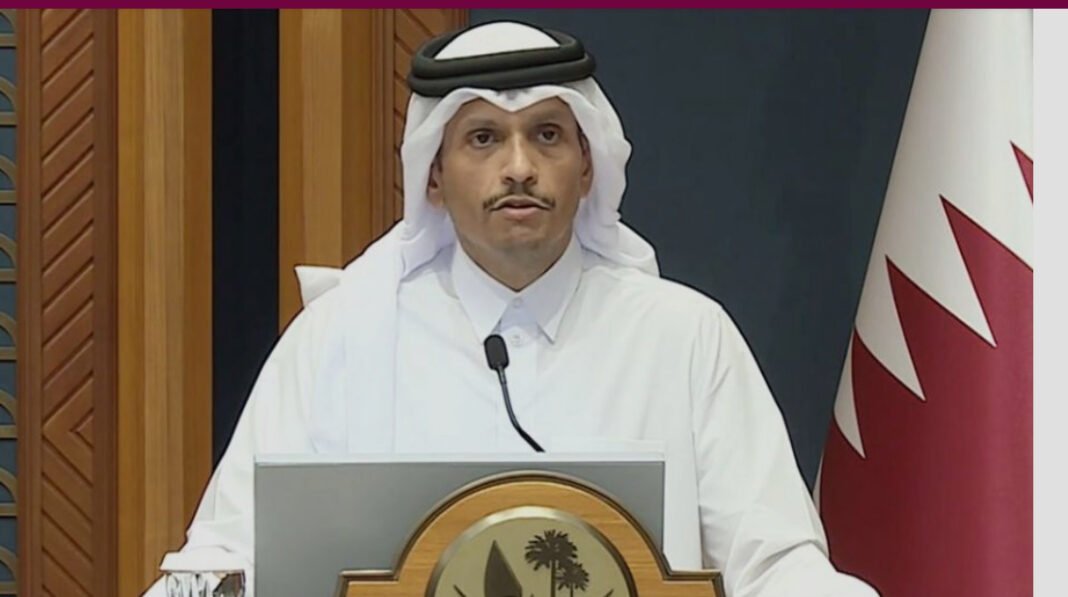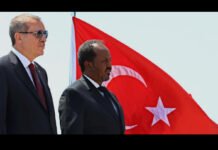Tuesday. June 24,2025-HAN
Nassima Babassa
Source: Doha News
Qatar brokered a ceasefire between Israel and Iran after a U.S. base was hit, but the truce is already under strain amid mutual accusations of violations.
A tentative ceasefire between Israel and Iran, brokered by Qatar and announced by U.S. President Donald Trump early on Tuesday, is already showing signs of strain as both Israel and Iran stand accused of violating it just hours after it came into effect.
The agreement followed intense diplomatic efforts, triggered by a dramatic Iranian missile strike on the U.S. Al Udeid Air Base in Qatar on Sunday night. Shortly after the attack, Trump held urgent talks with Qatari Emir Sheikh Tamim bin Hamad Al Thani and Vice President J.D. Vance.
During the call, Trump informed the Qatari leader that Israel had agreed to a ceasefire and asked for Qatar’s help in securing Iranian compliance. Qatari Prime Minister Sheikh Mohammed bin Abdulrahman Al Thani later convinced Tehran to accept the deal, according to diplomats briefed on the negotiations.
Trump declared the ceasefire on his social mediaplatform as “complete and total,” outlining a phased implementation: Iran would stop firing first, followed 12 hours later by Israel. A formal end to what he called “THE 12 DAY WAR” was to follow after 24 hours.
“Israel & Iran came to me, almost simultaneously, and said, ‘PEACE!’ I knew the time was NOW. The World, and the Middle East, are the real WINNERS!” he posted on Truth Social.
Iranian state media hailed the ceasefire as a victory, claiming it was “imposed on the enemy”, while Israeli Prime Minister Benjamin Netanyahu’s office confirmed acceptance of the deal but warned Israel would “respond forcefully to any violation”.
How the conflict escalated
The latest round of hostilities began on 13 June when Israel launched surprise airstrikes on Iranian nuclear sites, citing an imminent threat. Iran responded with missile barrages.
The U.S. joined the conflict on 21–22 June, striking Fordow, Natanz, and Isfahan nuclear facilities with Tomahawk missiles in “Operation Midnight Hammer”.
Iran’s retaliation came on 23 June, when it launched 14 missiles at the Al Udeid base in “Operation Glad Tidings of Victory”.
U.S. and Qatari defences intercepted most of them. No casualties were reported, though Qatar strongly condemned the strike as a “flagrant violation” of its sovereignty. Iran claimed it was acting in self-defence and had no intent to target Qatar directly.
Independent estimates suggest at least 974 people were killed in Iran, including 268 military personnel and 387 civilians. Israel reported 28 deaths from Iranian missile strikes.
Regional and international fallout
Qatar, which played a key role in mediating the ceasefire announced on Tuesday, condemned Iran’s strike on Al Udeid as “unacceptable,” with Prime Minister Sheikh Mohammed bin Abdulrahman Al Thani saying Doha was “taken by surprise” by an attack from a “friendly neighbour”. He reiterated Qatar’s right to respond but called for restraint and de-escalation.
Arab states, including Saudi Arabia, the UAE, and Egypt, condemned the missile strike as a violation of Qatari sovereignty.
UN Secretary-General António Guterres said he was “deeply alarmed” by the escalation. French President Emmanuel Macron warned that the flare-up increased the risk of Iran secretly restarting uranium enrichment.
Global condemnation mounts after Iranian missile strike on U.S. base in Qatar
Ceasefire falters within hours
Hours after the ceasefire deadline passed on Tuesday, Israel accused Iran of firing two missiles toward its northern territory, violating the 4:00 a.m. Tehran-time cutoff. Israeli Defence Minister Israel Katz ordered “intense strikes on Tehran”, saying Iran would be made to “tremble”.
Iran’s military denied launching any missiles after the truce, calling the accusations “false,” according to the Associated Press.
Simultaneously, explosions rocked Beersheba in southern Israel from an earlier Iranian strike, killing four people and wounding 20.
President Trump expressed frustration, telling reporters that both sides had “violated the deal,” though he singled out Israel.
On Truth Social, he wrote: “ISRAEL. DO NOT DROP THOSE BOMBS. IF YOU DO IT IS A MAJOR VIOLATION. BRING YOUR PILOTS HOME, NOW!”
Later, he claimed: “ISRAEL is not going to attack Iran. All planes will turn around and head home, while doing a friendly ‘Plane Wave’ to Iran. Nobody will be hurt. The ceasefire is in effect!”
Qatar intercepts Iranian missiles targeting U.S. base — as it happened
The ceasefire remains precarious. According to AP, Iran’s Supreme National Security Council has instructed its military to remain on high alert and “respond decisively” to any further Israeli attacks.
Whether the truce marks a true end to direct conflict between Israel and Iran remains to be seen. But for now, U.S. pressure, Qatari mediation, and intense diplomacy have succeeded in at least pausing the region’s most dangerous confrontation in years.




